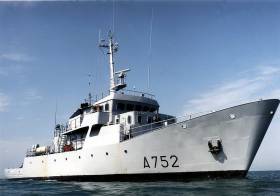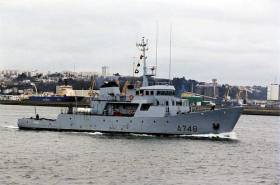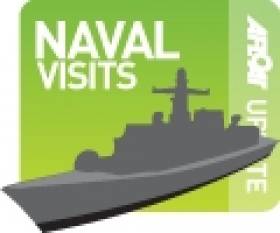Displaying items by tag: Leopard class
French Navy Léopard Class Schoolships On Visit
#NavalVisits - A trio of French Navy trainee ships docked in Dublin Port for a crew rest and recreation visit to the capital this weekend, writes Jehan Ashmore.
The Léopard class school-training vessels each with 18 students, had arrived yesterday and berthed along Sir John Rogersons Quay.
Each of the small ships measure 43m in length and have a beam of 8.30m. The trio are the Lynx, Panthère and Tigre.
Displacing 335 tonnes, the sisters are part of an eight-strong class that were commissioned in the early 1980's. Among them Jaguar which along with Tigre called to Dun Laoghaire Harbour just over a year ago.
Arnament comprises of pair of 12.7mm guns.
The range of the Léopard class is 5,000 nautical based on a speed of 12 knots.
#Flotilla – A French Navy flotilla all consisting of training vessels are visiting Dublin where also in port is the Finnish Navy’s flagship, writes Jehan Ashmore.
The small training ships that arrived yesterday belong to the Léopard class which were commissioned into service from 1982 and the following year. In fact almost all the class are in the capital given that five of the eight training ships are making the four-day call.
Leadship and class namesake, Léopard is visiting along with Chacal, Guépard, Tigre and Panthère. Each vessel is just 335 displacement tonnes and have a length of 43.0m on a beam of 8.30m. In addition to the training cadets, the class are used to carry out anti-pollution duties.
As for the Finnish Navy’s flagship, FNS Hämeenmaa, this is the first caller to the capital undertaken by the Nordic nation. The minelayer of 1,300 displacement tonnes had arrived on Wednesday direct from Funchal, Madeira.
Naval School-Ships to take Class to Dublin
#NAVAL VISITS - The first foreign naval visitors to Dublin Port in 2012 will be the French Navy, as five of an eight-strong class of school-training ships from Brest are due to dock on Friday, writes Jehan Ashmore.
The octet belong to the Léopard class though the namesake leadship, Léopard (A 748) and Jaguar (A 750) will not be forming as part of the visiting flotilla.
Those that will be making the weekend port of call, berthing at Sir John Rogersons Quay will be Panthère (A 749) and Lynx (A 751) both commissioned in 1982 and the remaining quartet Guépard (A 752); Chacal (A 753); Tigre (A 754) and Lion (A 755) which entered service the following year. For a photo of the latter vessel and one of her sisters the Chacal click HERE.
Each of the 44 tonnes vessel's measure 17.5m long and have a beam of 6.40m and drawing a draft of 2.40m. To read more on the class characteristics click HERE.
The class follow in the wake of the last French Naval vessel to enter Dublin Bay, PSP Cormoran (P677). The OPV provided guard-ship duties when accompanying the Solitaire du Figaro race fleet during the stopover to Dun Laoghaire Harbour last August, as previously reported on Afloat.ie
































































